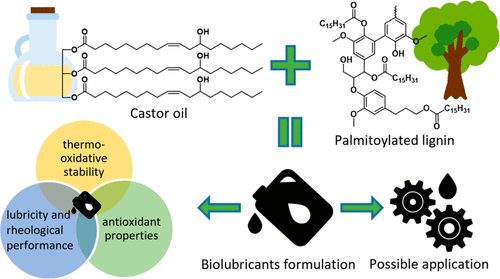当前位置:
X-MOL 学术
›
ACS Sustain. Chem. Eng.
›
论文详情
Our official English website, www.x-mol.net, welcomes your
feedback! (Note: you will need to create a separate account there.)
Lignin-Based Additives for Improved Thermo-Oxidative Stability of Biolubricants
ACS Sustainable Chemistry & Engineering ( IF 7.1 ) Pub Date : 2021-09-09 , DOI: 10.1021/acssuschemeng.1c02799 Monika A. Jedrzejczyk 1 , Sander Van den Bosch 2 , Joost Van Aelst 2 , Korneel Van Aelst 2 , Panos D. Kouris 3 , Mohamed Moalin 4, 5 , Guido R. M. M. Haenen 5 , Michael D. Boot 3 , Emiel J. M. Hensen 3 , Bert Lagrain 2 , Bert F. Sels 2 , Katrien V. Bernaerts 1
ACS Sustainable Chemistry & Engineering ( IF 7.1 ) Pub Date : 2021-09-09 , DOI: 10.1021/acssuschemeng.1c02799 Monika A. Jedrzejczyk 1 , Sander Van den Bosch 2 , Joost Van Aelst 2 , Korneel Van Aelst 2 , Panos D. Kouris 3 , Mohamed Moalin 4, 5 , Guido R. M. M. Haenen 5 , Michael D. Boot 3 , Emiel J. M. Hensen 3 , Bert Lagrain 2 , Bert F. Sels 2 , Katrien V. Bernaerts 1
Affiliation

|
There is an environmental concern regarding the use of petroleum-based lubricants, which are generally toxic and nonbiodegradable. Biobased lubricants, such as vegetable oils, are the alternative: they show excellent lubricity, are readily biodegradable and nontoxic. However, a major disadvantage of using vegetable oils in lubricant applications is their lack of thermo-oxidative stability, which can be improved by antioxidant additives. Here, we propose the use of lignin-based additives in biolubricant formulations to improve this feature, based on lignin’s known antioxidant properties. To ensure a stable dispersion in vegetable oil, lignin was partially esterified. Antioxidant properties of lignin before and after palmitoylation were demonstrated in a 2,2-diphenyl-1-picrylhydrazyl (DPPH) assay. Four different lignin-based fractions, commercial Protobind P1000 soda lignin from straw, solvolytically fractionated Protobind P1000 lignin and two lignin fractions from reductively catalyzed fractionation (RCF) of native birch wood, were tested in biolubricant formulations with castor oil as base oil. Those lignin fractions exhibited excellent performance compared to butylated hydroxytoluene (BHT), a commonly used petroleum-based antioxidant. Formulations of modified lignin in castor oil possess improved thermo-oxidative stability, as illustrated by their increased oxidation induction time. Additionally, rheological and tribological tests demonstrate similar, or in some cases improved, lubricating properties compared to castor oil. This study showcases the successful incorporation of lignin-based antioxidants in biolubricant formulations, tackling the major disadvantage of vegetable oils as environment-friendly lubricants.
中文翻译:

用于提高生物润滑剂热氧化稳定性的木质素添加剂
使用石油基润滑剂存在环境问题,这些润滑剂通常有毒且不可生物降解。生物基润滑剂,如植物油,是替代品:它们显示出优异的润滑性,易于生物降解且无毒。然而,在润滑剂应用中使用植物油的一个主要缺点是它们缺乏热氧化稳定性,这可以通过抗氧化添加剂来改善。在这里,基于木质素已知的抗氧化特性,我们建议在生物润滑剂配方中使用基于木质素的添加剂来改善这一特性。为了确保在植物油中的稳定分散,木质素被部分酯化。在 2,2-二苯基-1-苦基肼 (DPPH) 测定中证明了棕榈酰化前后木质素的抗氧化特性。四种不同的基于木质素的馏分,来自稻草的商业 Protobind P1000 苏打木质素、溶剂分解分离的 Protobind P1000 木质素和来自天然桦木的还原催化分馏 (RCF) 的两种木质素馏分,在以蓖麻油为基础油的生物润滑剂配方中进行了测试。与常用的石油基抗氧化剂丁基化羟基甲苯 (BHT) 相比,这些木质素馏分表现出优异的性能。蓖麻油中改性木质素的配方具有改进的热氧化稳定性,如其增加的氧化诱导时间所示。此外,流变学和摩擦学测试表明,与蓖麻油相比,润滑性能相似或在某些情况下有所改进。该研究展示了在生物润滑剂配方中成功加入基于木质素的抗氧化剂,
更新日期:2021-09-20
中文翻译:

用于提高生物润滑剂热氧化稳定性的木质素添加剂
使用石油基润滑剂存在环境问题,这些润滑剂通常有毒且不可生物降解。生物基润滑剂,如植物油,是替代品:它们显示出优异的润滑性,易于生物降解且无毒。然而,在润滑剂应用中使用植物油的一个主要缺点是它们缺乏热氧化稳定性,这可以通过抗氧化添加剂来改善。在这里,基于木质素已知的抗氧化特性,我们建议在生物润滑剂配方中使用基于木质素的添加剂来改善这一特性。为了确保在植物油中的稳定分散,木质素被部分酯化。在 2,2-二苯基-1-苦基肼 (DPPH) 测定中证明了棕榈酰化前后木质素的抗氧化特性。四种不同的基于木质素的馏分,来自稻草的商业 Protobind P1000 苏打木质素、溶剂分解分离的 Protobind P1000 木质素和来自天然桦木的还原催化分馏 (RCF) 的两种木质素馏分,在以蓖麻油为基础油的生物润滑剂配方中进行了测试。与常用的石油基抗氧化剂丁基化羟基甲苯 (BHT) 相比,这些木质素馏分表现出优异的性能。蓖麻油中改性木质素的配方具有改进的热氧化稳定性,如其增加的氧化诱导时间所示。此外,流变学和摩擦学测试表明,与蓖麻油相比,润滑性能相似或在某些情况下有所改进。该研究展示了在生物润滑剂配方中成功加入基于木质素的抗氧化剂,











































 京公网安备 11010802027423号
京公网安备 11010802027423号